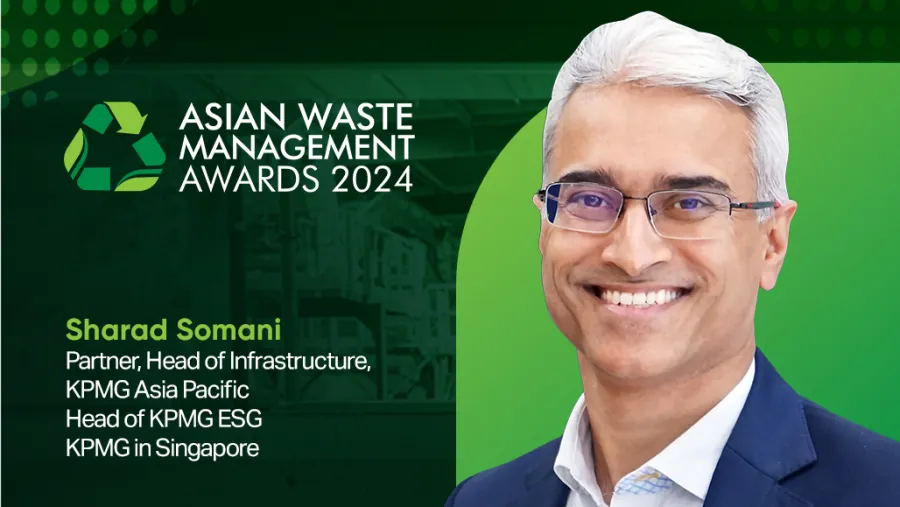
KPMG’s Sharad Somani stresses sustainability goals require a multi-faceted approach
He emphasised the importance of tailored solutions, technological integration, and sustainability in addressing waste management challenges and opportunities in Asia.
With rapid urbanisation and industrial growth in Asia, waste management has become increasingly critical. The challenge of handling the vast volumes of waste generated requires companies to play a pivotal role in implementing innovative solutions and driving progress towards a more sustainable future.
Offering invaluable insights in this landscape is Sharad Somani, who leads the infrastructure advisory practice for KPMG Asia Pacific and is also the Head of KPMG ESG at KPMG in Singapore. His areas of expertise include project financing, economics and regulatory advisory, as well as energy transition.
He has worked on key projects in Southeast Asia and the Middle East, offering expertise in utility-scale renewable energy projects, smart city infrastructure deployments, technology use in effective project delivery and sustainable energy transition.
With over 20 years of extensive experience, Somani’s notable work spans the infrastructure sector, covering transport, broadband, urban or industrial infrastructure, power, and liquefied natural gas. He has worked on projects for governments, utility providers, developers, and multilateral agencies, supporting them in areas such as conceptualisation, financing, implementation, and performance improvement.
As a judge at the Asian Waste Management Excellence Awards 2024, Somani emphasised that companies and countries should see Asia's waste not merely as a problem but as an opportunity to distinguish themselves as leaders in waste management innovation.
Can you share what your experience has been like leading the infrastructure advisory landscape in Asia Pacific? What kind of solutions or services do you provide your clients?
Asia Pacific is a dynamic region that has had to evolve fast to tackle major challenges like urbanisation, climate change and digital transformation. It is also diverse, with a mix of emerging and mature economies. Each has its challenges, which means solutions must be tailored accordingly.
This makes Asia Pacific an exciting environment in which to work. Over the years, I have been involved in a wide variety of infrastructure projects, with transport, broadband, and power – including renewable energy, water and Energy from Waste (EfW) – amongst the most important.
We have clients from both the public and private sectors in areas including urban infrastructure, analytics on maintenance trends, risk-based prioritisation maintenance frameworks, growth strategies for infrastructure providers, and investment strategies in clean energy. The breadth of our scope reflects the region’s immense needs. A report by the Asian Development Bank estimated that US$1.7t annually is required for infrastructure in Asia and the Pacific simply to maintain growth.
With the rising importance of technology in sustainable energy transition, what do you think are some challenges that prevent companies from fully realising their sustainability goals and integrating technology into their operations?
Technology can power the twin engines of a sustainable energy transition – accelerating the shift from fossil fuels to cleaner energy sources and delivering improvements in energy efficiency.
Although businesses are increasingly aware of the benefits that tech-enabled solutions bring, macroeconomic headwinds often compel them to choose between prioritising resources to strengthen their core business and investing in ancillary functions like their net-zero commitments. In this regard, regulatory demands on sustainability are useful as they help to turn net-zero commitments into a business imperative, pushing companies to embrace robust ESG practices, including transitioning to clean energy. Firms that do not do so might find themselves with less access to financing, which can hinder their core business.
Another challenge that businesses face is not knowing what and which technology to implement. They will need to start by understanding where their priorities for technology investments lie and how these solutions match up to their business goals, instead of rushing into the process. Processes that can measure returns can help to justify investments, especially as some of these involve significant upfront costs.
Lastly, one particular challenge related to AI solutions is that the technology itself is energy-intensive, which could undercut a firm’s net-zero goals. Some workarounds could involve buying renewable energy credits or using technology models tailored to a specific task instead of a massive, all-purpose generative model.
Ultimately, realising sustainability goals requires a multi-faceted approach and firms will need to be able to justify their investments before embarking on this transition.
Whilst there has been research highlighting the growing waste problem in Asia, what opportunities does this present for companies in terms of innovations in waste management?
Increasing consumer demand for sustainable products is driving a surge of impact investment that targets environmental sustainability, particularly in sectors like waste management and recycling. Consequently, companies and countries should view Asia’s waste not just as a problem but also as an opportunity to set themselves apart as innovators in waste management.
These solutions or innovations do not always need to be technological solutions, but they can also be creative ways put in place to manage waste efficiently. Singapore’s regulated extended producer responsibility (EPR) system that is being used to manage e-waste and packaging waste is a prime example of how governments are playing their part. The involvement of multilateral institutions is also helpful. Some are investing to support policy interventions and technological solutions and to promote investments in a circular economy.
One area ripe for improvement is the region’s open dumps and landfills without gas capture, which are responsible for a portion of greenhouse gas (GHG) emissions emitted globally. This offers major opportunities for companies to develop new business models that leverage technology to process and recycle waste and to create sustainable products from waste materials – commonly known as developing a closed loop or circular economy.
Whilst a circular economy is more prevalent and has seen better successes in the construction industry, this closed-loop approach is not part of most companies’ DNA. Creating high-quality and successful closed-loop systems can be challenging, and there are often difficulties in recovering and processing materials from different sources and streams. Some of these products may also have low or negative value, and it may be difficult to reflect the environmental costs of reprocessing these products into their cost price. This means that there will be little incentive for producers or consumers to adopt closed-loop practices.
With that being said, these roadblocks present many opportunities for companies to come up with solutions to stimulate the development of closed-loop markets, such as scaling up efforts using the right technologies and securing output demand to ensure economies of scale.
Having 20 years of industry experience under your belt, how do you think the waste management landscape will evolve in the coming years amidst the need to drive a more positive environmental impact?
The shift towards more sustainable and technologically advanced waste management solutions signals a transformative period for the industry, with significant implications for its future direction.
One key trend is the growth of the Energy from Waste (EfW) market, particularly in regions like Southeast Asia. As governments and industries seek to decarbonise their energy sources, EfW is emerging as a crucial component in this transition, especially with countries struggling with a waste management issue and a rapidly growing demand for energy. The expansion of this market not only reduces reliance on fossil fuels but also contributes to a more sustainable energy mix, aligning with global decarbonisation goals. Southeast Asia’s EfW market, for example, is forecast to experience strong growth through 2029.
Global partnerships and initiatives are playing a crucial role in fostering an environment conducive to sustainable waste management. These collaborations focus more on laying future groundwork for long-term systemic change as opposed to addressing immediate challenges. As the industry shifts towards forming alliances, it becomes increasingly important for businesses to sharpen their competitive edge, not only in their local markets but also on a regional scale. This focus will position them to capitalise on significant opportunities, particularly in cross-border collaborations, which are becoming more prominent as part of the global push for sustainable waste management practices.
What criteria are you going to look into when assessing innovations in waste management practices?
The first is its potential impact—the extent it contributes to environmental sustainability and waste reduction and promotes circularity. Technical feasibility is also key, as is regulatory compliance to ensure it meets waste management regulations and standards.
Given that waste management is a deeply entrenched issue, the project’s long-term viability, cost-effectiveness, and scalability will also be important. Additionally, it would be interesting to explore how these projects can address the social stigma associated with waste, as this is often an underestimated factor that can hinder success.
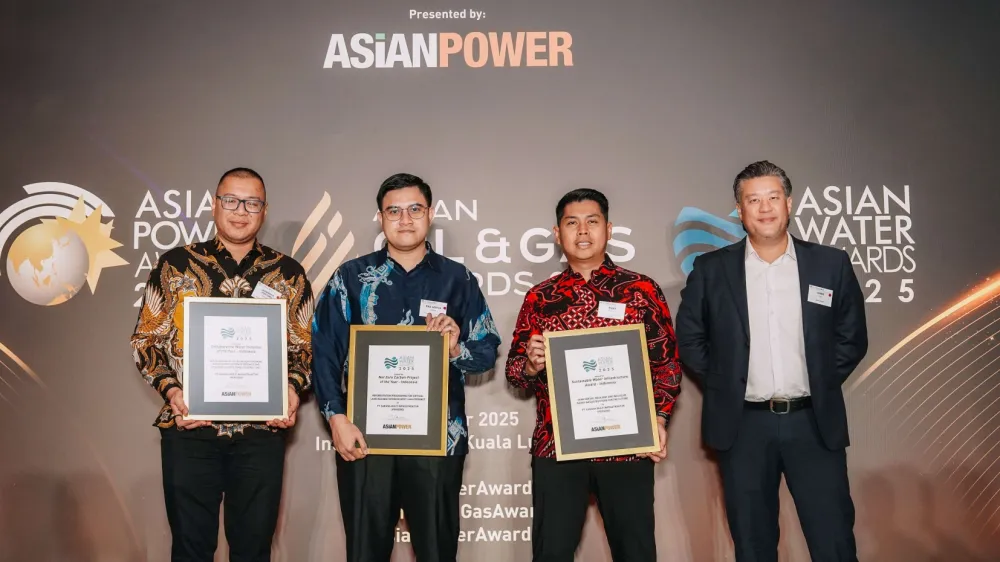
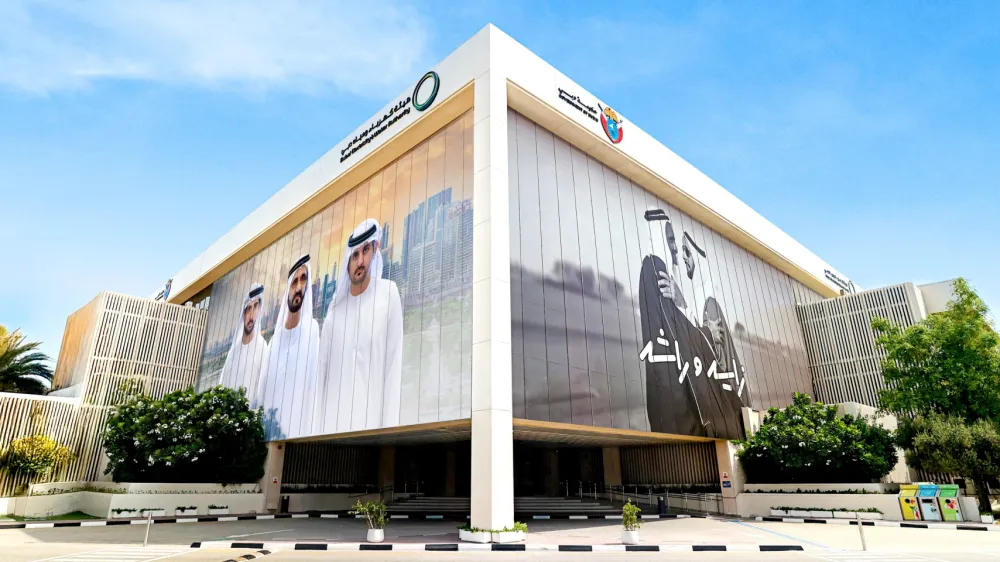
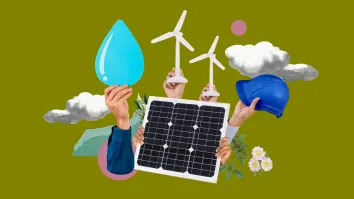
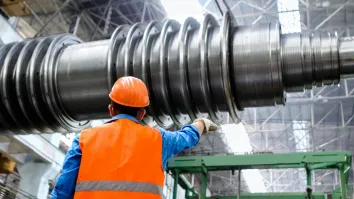
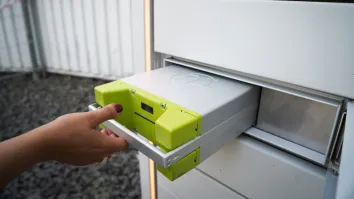
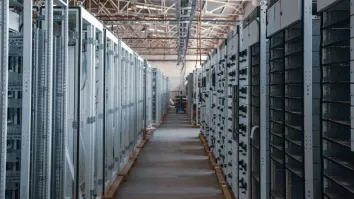













 Advertise
Advertise







